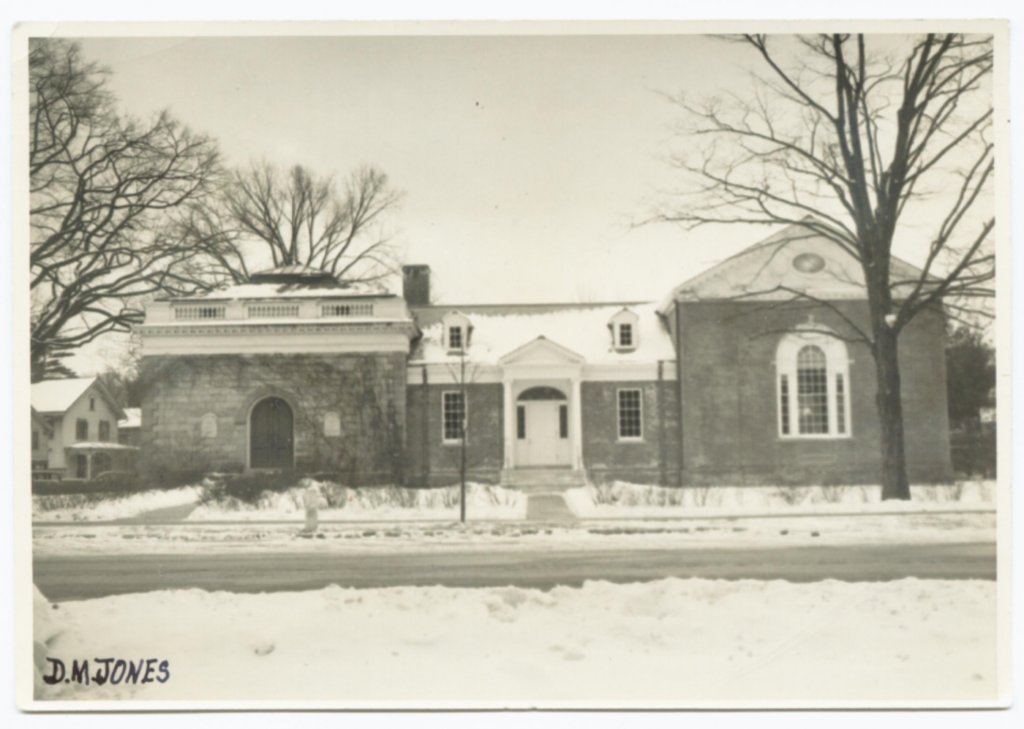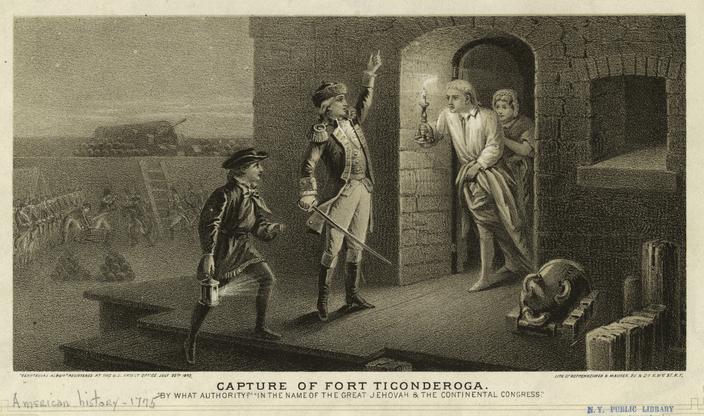Welcome to Bidwell Lore number 106!
This week we are going to dig further into the William Goodrich story starting with some mid 20th century correspondence between what is now the Stockbridge Library and historians in Vermont.
Responding to a letter from Grace Bidwell Wilcox, curator of the Stockbridge Historical Room [1], John Spargo, Director-Curator of the Bennington Historical Museum and Art Gallery in Bennington, Vermont, writes on August 4, 1949:
“I am not certain, but believe that your Major Goodrich is the Major Goodrich who settled in Middlebury in 1784. Anyhow there was a William Goodrich who came to Middlebury with a brother, or brothers, in 1784, from Stockbridge, Mass.
Now, we know that Major Goodrich marched with his militia Company from Stockbridge, Mass., at the request of Governor Chittenden and Ethan Allen to help guard the frontiers of Vermont. We also know that just about that time William Goodrich began to be included among the grantees in almost all the new town charters granted. He was an original grantee of Vershire, in Orange County, 1780; Randolph, also Orange County, 1781; Wolcott, Lamoille County, 1781. The very first property transaction in Vershire was the transfer of three whole shares or rights to William Maltby of Lenox, for L90.0.0. I am reasonably certain that his grave is in the old Middlebury cemetery.”
In a March 11, 1955, letter to Grace Bidwell Wilcox, Vermont Historical Society Librarian and Museum Director Clara E. Follette wrote:
“We were very much interested in your query concerning William Goodrich. We have been trying to find a connection between the name Goodrich and Ethan Allen for some months without success. I believe some descendent of Mrs. Fannie Allen’s by a later husband married a Goodrich, but this did not seem to be what we wanted.
A sword has come to us, said to belong to Ethan Allen, and to have come down possibly through a Goodrich family. Perhaps if Major William (Goodrich) led Ethan’s funeral procession he may have received the sword at that time…”

The following story from 1789 can be found in Stewart Holbrook’s biography of Ethan Allen: [2]
“Recorded history now picks up the thread again. Mrs. Allen appears to have set the funeral for the next day, and a number of neighbors assembled at the General’s home. But Ira Allen, who had just returned to Onion River from a trip, asked that the ceremonies be delayed. His brother, he said, had often expressed a hope that he would be ‘buried with arms’, that is, a military funeral, and Ira needed a little time to make arrangements.
Accordingly, messengers were sent to notify all in the sparsely settled region around Burlington. And it seems to have got as far south as Vergennes, for Major Goodrich, an old soldier of that place, dropped everything and show shoed to Burlington – the only way he could get there.
Ethan’s body was taken to Ira’s, about a mile away, which was much larger than the General’s. Here people came from direction. Every old Green Mountain boy, every old soldier, every hunter and trapper and farmer who got the word in time to follow their chief to what he had often termed a sod jacket. Somebody turned up with a small cannon.
Major Goodrich marshaled the procession, which was surprisingly large and included at least sixteen squads of men in close order. Muffled drums beat the way, and crossed swords were laid on the coffin lid. Old Governor Chittenden was there and marched every step of the way, acting as one of the pall bearers.
In fresh snow the columns moved across the ice above the mill dam at Onion River Falls. Every little way a halt was made and the cannon fired. On the brow of the hill overlooking the river the procession came to its last halt. The grave had been dug through ground as hard as marble, in a small clearing in the forest. Stumps stood all about. The coffin was opened, and little Henry Collins, who had known the General at home recalled years later that he looked natural in the pine box.
The coffin was closed and lowered into the ground, while three volleys of musketry were fired. There was no religious exercises. Snow was still falling while Major Goodrich spoke briefly, referring to what General Allen had accomplished for his country and his state, and what he had suffered for them, too.” [3]

Courtesy of The New York Public Library.
In addition to his connection via William Goodrich, Ethan Allen also had another connection to the Berkshires. At some point, there was speculation that Allen had been born in Berkshire County which was later determined to be untrue as seen in this headline from The Berkshire County Eagle dated March 27, 1931: Birth of Ethan Allen in Tyringham is discredited. The article went on to read that there were Allens in Tyringham, but not Ethan Allen’s family.
Lillian E. Preiss, in her 1976 book Sheffield Frontier Town, wrote about Allen on page 42: “Another Revolutionary War hero was an occasional resident. Settling his family on a farm in Sheffield in 1767, Ethan Allen escaped the tedium of town life on the pretext that the Wentworth Grants offered a fine opportunity for him to acquire pelts for his brother Heman’s store in Salisbury, Connecticut. Escaping also the sharp tongue of a nagging wife, Allen spent more and more time speculating in land, engaging in violent border disputes with the New Yorkers who claimed Wentworth titles, writing angry tracts against New York Governor Tyron and signing them ‘The Philosopher’, leading the Green Mountain Boys in capturing its valuable cannon, and joining the expedition to Canada in 1775. During the relatively short periods of time he spent in Sheffield, he fathered two daughters, Lucy Caroline and Mary Ann. His only son, Joseph, died of small pox at age eleven and presumably was buried in Sheffield, although no trace of his grave has yet been found. When Allen returned to Sheffield after a three-year captivity by the British, he found that his brother Zinri, who had taken care of his farm and family for ten years, had died and the remnants of Ethan’s family had moved to Arlington on the Grants.” [4]
“For some reason, Ethan Allen was spending a good deal of time in Berkshire County. This fall (1781 or 82) he bought a house in New Marlboro and his letters to Sherwood he mentioned his circuit and his tour through Massachusetts, Connecticut, and New York.” [5]
Next week we will finish up our series on William Goodrich with a bit more about his connection to Ethan Allen.
1. Now the Stockbridge Library Museum & Archives.
2. Holbrook, Stewart. Ethan Allen (New York: The MacMillan Company, 1940), Page 251.
3. Goodrich was born in 1737 in Sheffield and would have been 52 when snowshoeing to the funeral.
4. Apparently Allen leased the farm or possibly his brother owned the farm. During a deed search at the Berkshire Middle Registry of Deeds, I only found one deed under his name for land in New Marlboro. Moses Soul to Ethan Allen, Book 14, Page 221 (1789).
5. Pell, John. Ethan Allen (Boston: Houghton-Mifflin Company, 1929), page 231